Finding the right rum substitutes can be challenging. The deep and complex flavors of rum are pretty unique and not easily replaced. Another aspect of the requirement of a substitute might have to do with avoiding the alcohol content of rum, which is challenging too since the alcohol is a big component of rum and its taste.
Yet, if there’s a need, a substitution must be made. Thankfully, there are a few options we can turn to, and will be discussed in detail in this article.
For a quick answer, suitable alternatives for rum are bourbon, brandy/cognac, rum extract, fruit juices like apple and grape, flavoring, and essences.
Your choice of substitute will also depend on additional factors, like your recipe and the type of rum required. Light and dark rum can have different substitutes. Similarly, substitutes for cooking, baking, and cocktails can be different.
Let’s get to the details!
Table of Contents
Best Rum Substitutes And Options For Your Recipe
1. Rum Extract – Options With And Without Alcohol
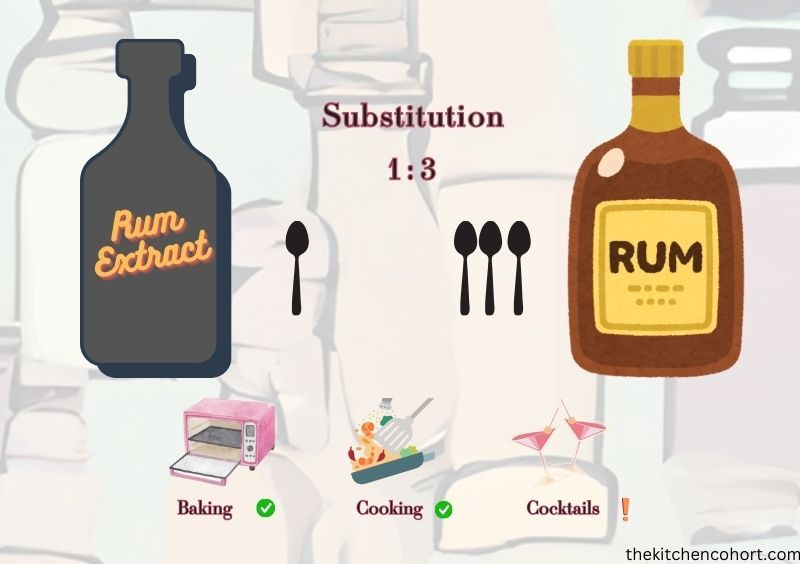
Rum extract is perhaps the most convenient and closest substitute you could get for rum. As an extract, this has concentrated rum flavors, with a relatively small amount of alcohol. If you’re looking for an alcohol-free option, you’ll have to dig in a bit deeper.
Most rum extracts do contain a small quantity of alcohol, though no-alcohol versions are available as well. The latter can be a bit more expensive and can be tougher to find in many stores. Getting them online should be a breeze.
Rum extract can work as rum substitutes for most cooking and baking recipes. They can also work with mocktails, though they aren’t that good an option for cocktails.
The quantity of extract you use for substitution will depend on the brand you use. However, the amount used in a recipe will always be significantly less than the rum required. Often, it’s a 1:3 ratio, where one spoon of rum extract is used for 3 spoons of rum.
2. Brandy Or Cognac
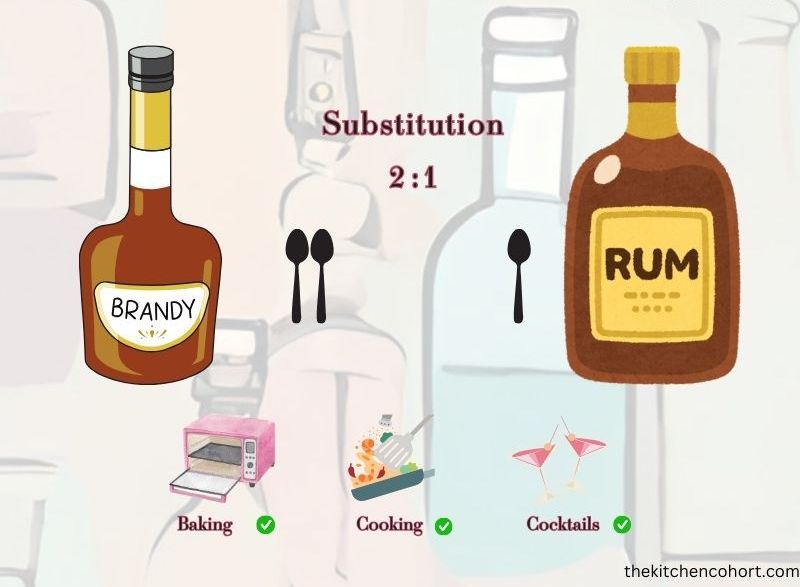
A strong brandy can work as a substitute for rum in several cooking recipes, especially those involving meats and sauces. It also works decently well for glazing and deglazing. However, while brandy has complex flavors, it isn’t as strong as rum with flavors.
To get around that, it’s best to use a high-quality brandy, perhaps one that goes high on alcohol content. If you’re using a conventional brandy for rum substitute, you can go with a 1:2 ratio, which means using two spoons of brandy where the recipe calls for one spoon of rum.
Although, if you’re using Cognac, things change a bit. Cognac is a type of brandy, but with a sweeter taste and more refined flavors. Generally, you can use it as a substitute for rum in 1:1 ratio (equal parts).
Brandy can replace rum in most recipes, including cooking, baking, and cocktails. However, you should expect some change in flavor.
3. No-Alcohol Rum
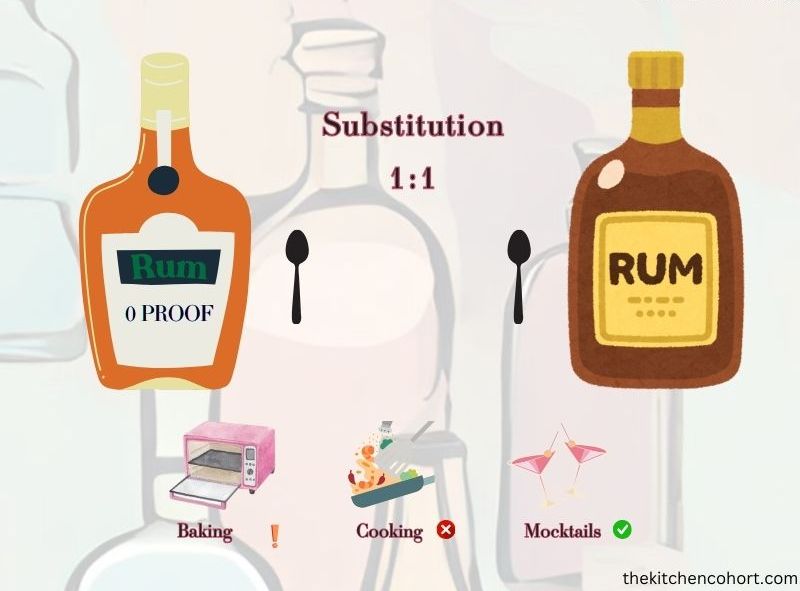
Want to skip alcohol but still keep the flavor of rum? Several brands sell their version of no-alcohol rum. As you can guess, this is sold in bottles, much like rum, but without any alcohol content. While these are attractive rum substitutes, they aren’t no-brainer picks. There is some nuance involved.
While the deeper flavors of rum are still there, the lack of alcohol alters the taste a bit. Besides, some processing has to be involved to get a no-alcohol rum.
This option works well for cocktails and mocktails, and also baking. Expect a change in texture when baking, since alcohol plays a role in making pastries and cakes a bit fluffier and flakier.
Generally, no-alcohol rum can be a rum substitute in a 1:1 ratio.
4. Rum Flavoring
Fairly popular in Germany, rum flavoring is a product that adds the rum aroma and a touch of flavor to the recipe. Keep in mind, this flavoring is generally used for aroma, and is not the same as an extract or essence. There are German recipes that explicitly call for rum flavoring aroma. So, this is an ingredient in its own right.
It’s great for baking and offers that touch of rum flavor while working as a rum substitute. These are usually available as small vials, so some experimentation might be necessary to get the flavoring right. Generally though, one vial is good enough for a full cake.
5. Bourbon
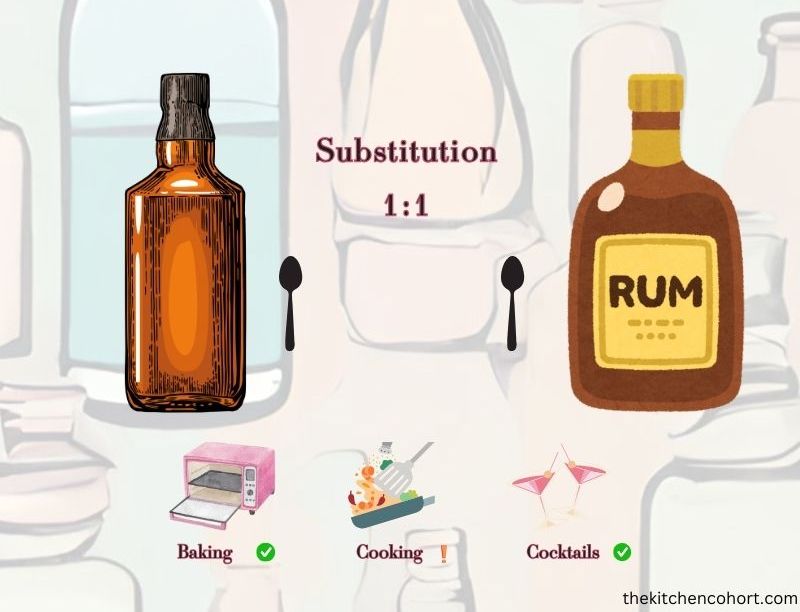
The quintessentially American Bourbon can work as a rum substitute in a pinch. It can work as a substitute in cocktails. It can be acceptable in baking, but can be difficult for cooking, though some enterprising cooks might stretch its uses there.
Rum is a bit sweeter than bourbon, so some changes might be necessary if you take this route.
6. Gin Or Tequila
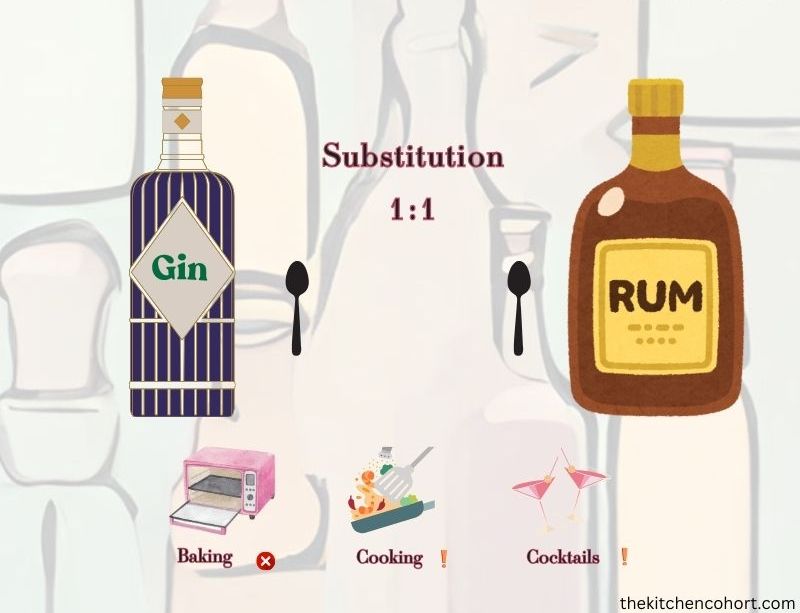
Gin and tequila can be decent substitutes if a recipe calls for white rum. Generally, white rum is utilized to add a touch of the rum flavor, without any effect on the color of the recipe.
Tequila works best with recipes involving fish, though it can be decent with other seafood as well.
Gin can be a decent substitute for recipes involving meat and fish.
When using these for rum substitutes, you can use gin or tequila, not both at the same time. And while these options work well for savory, meat, and fish recipes, they don’t fare well for baking needs.
7. Selection Of Fruit Juices
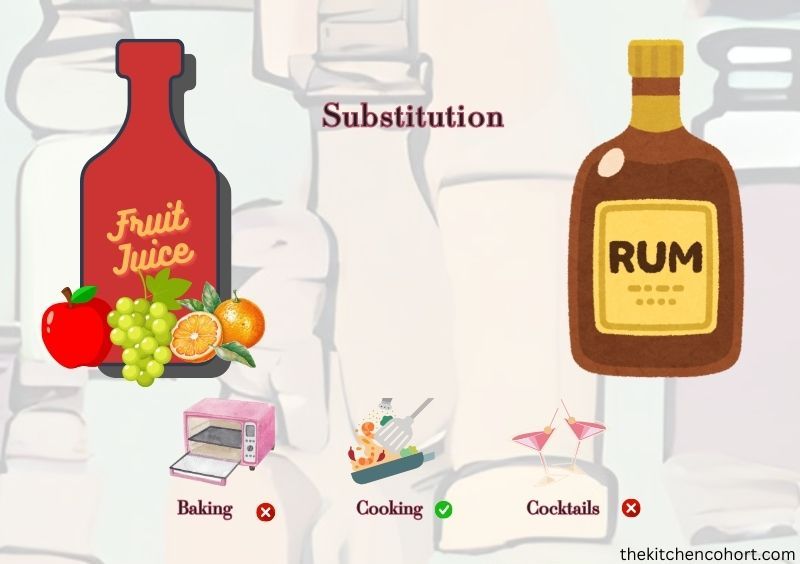
Using fruit juices as rum substitutes can be possible for some recipes, especially dressings and marinades. The better choice is to use unsweetened fruit juices, since they still have some natural touch and aren’t overflowing with sugar, like most commercial offerings. If things get too sweet, the juice can’t really be a decent alternative to rum.
The most likely choices are apple juice, white grape juice, apple cider, and fresh orange juice.
For the substitution, you would use around one-quarter to half-cup juice, depending on your taste preference. The recipe would have to be capable of handling the extra liquid, which is another reason why these substitutions work better for marinades and dressings.
8. Vanilla Extract
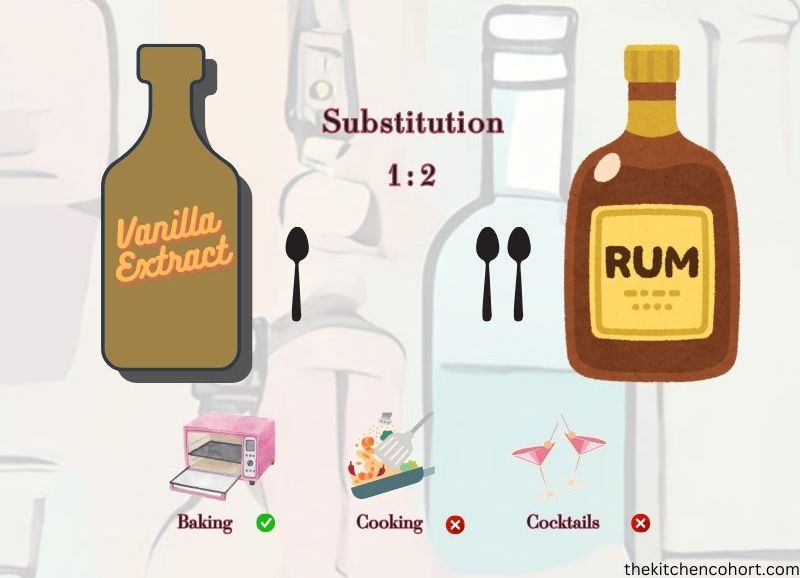
Vanilla extract can be a quick and decent rum substitute for some recipes, especially in baking. Of course, using vanilla extract will affect the overall flavor of the recipe. However, it can work as a decent choice if you’re in a tight spot.
Commonly available vanilla extract contains a small amount of alcohol. If you prefer one with no alcohol, you’ll have to specifically look for no-alcohol variants.
9. Molasses And Other Ingredients
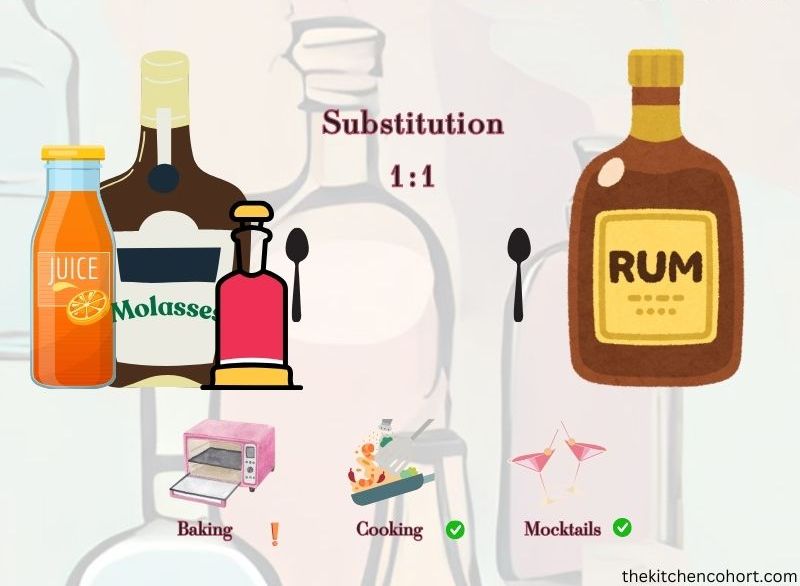
Rum comes from the fermentation of molasses. So, using molasses could work in a recipe as a rum replacement, especially since molasses has those lovely deep flavor undertones.
However, molasses is too syrupy and can throw the texture of the recipe off-balance. A way around that is to mix molasses with a small quantity of fruit juices (apple, orange, white grape juice). Adding a few drops of amaretto to this mix balances the flavor. This should make the mix a suitable alternative to rum in several recipes.
When taking this route, it’s best to be careful with the amount of juice added to the recipe. This way, you can avoid the recipe getting overly moist or too fruity.
This is a very useful substitution option for rum. However, it can feel like too much of a hassle, since multiple ingredients are involved.
10. Other Alcohols And Recipe-Specific Rum Substitutes

Sometimes, your substitution can depend on the recipe or the desire for more specific flavors. In such cases, it’s worth considering a few options.
Marsala wine can replace rum in your tiramisu recipe. You may also choose to go with brandy or cognac for substituting rum in tiramisu.
Amaretto can be a useful replacement for rum in many recipes. It has a strong flavor, isn’t too sweet, and has the right touch of bitterness. There will be a change in flavor, but it’s a natural consequence of substitution.
Much like marsala, sherry too can work as a rum substitute for several recipes, especially in baking. It’s flavorful and has a strong alcohol content. In most substitutions, you can use sherry in equal amounts to rum. However, in case a stronger flavor is desirable, it’s acceptable to use sherry in twice the amount as compared to rum.
Cachaça is another suitable substitute for rum. In fact, this famous Brazilian liquor has its origins associated with rum, and is often called Brazilian rum, though that term appears to have run out of favor. As things stand, the USA recognizes Cachaça as a type of rum and a distinct product of Brazil.
Besides, there are notable differences between the origins of rum and Cachaça. While rum is made from molasses, Cachaça is made from fresh sugarcane juice, which gives it somewhat different properties and taste.
Cachaça can be a suitable rum substitute in most cocktails, and might see some success in baking as well. However, it doesn’t quite work well for cooking.
Rum Substitutes Ripe For Your Recipe — Conclusion
Rum is a versatile ingredient. Its use in cocktails is self-evident, but it finds great use in cooking and baking as well. If there’s trouble and you don’t have rum available, it might still be possible to salvage a recipe before disaster strikes!
Using the right rum substitutes can work wonders in saving your recipe. Rum extract would be the best choice, but you can look into brandy, bourbon, and even ginger beer to fill in some flavors as substitutes. If you’d like to go entirely without alcohol, some fruit juices can be rum substitutes. Better yet, fruit juice mixed with molasses and a touch of amaretto can be your answer.

